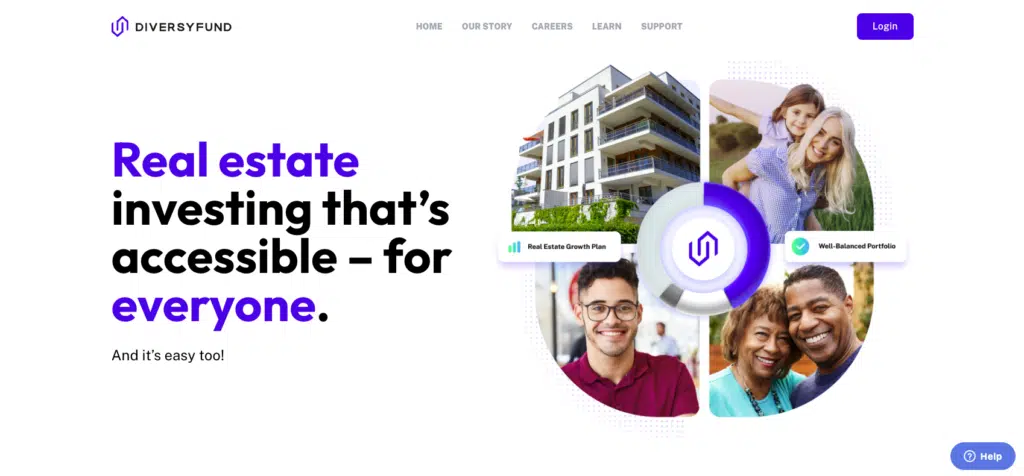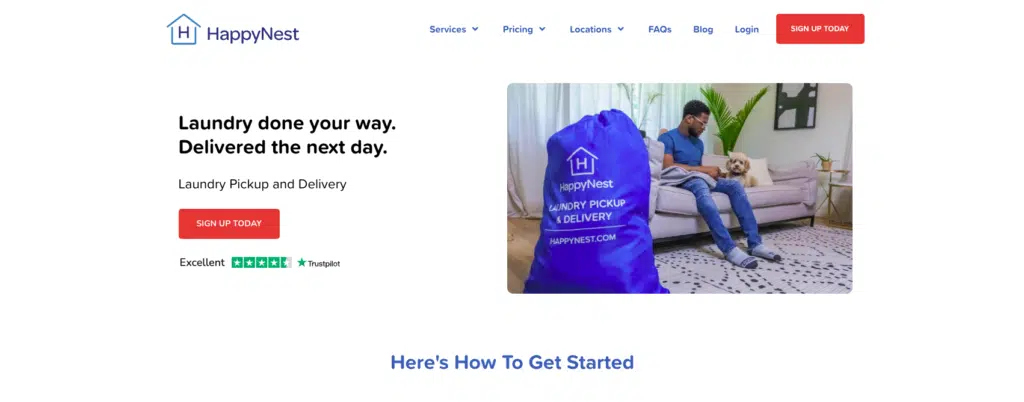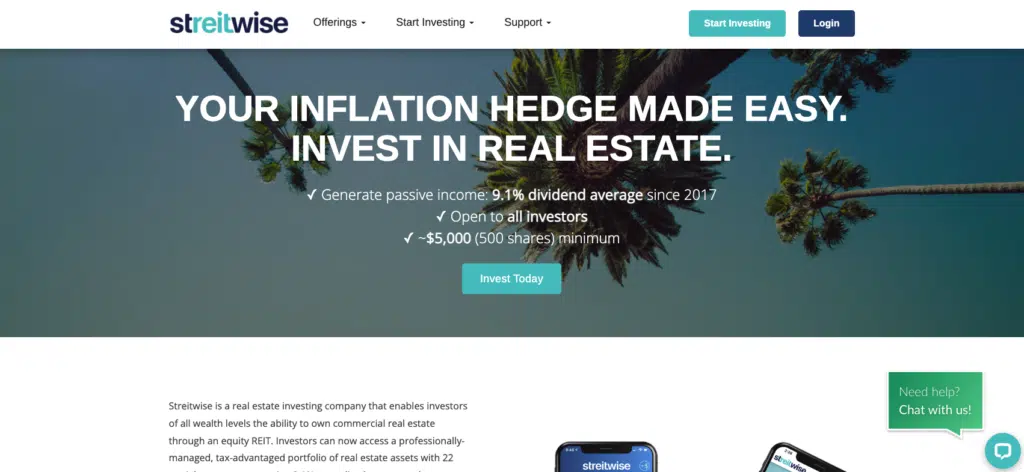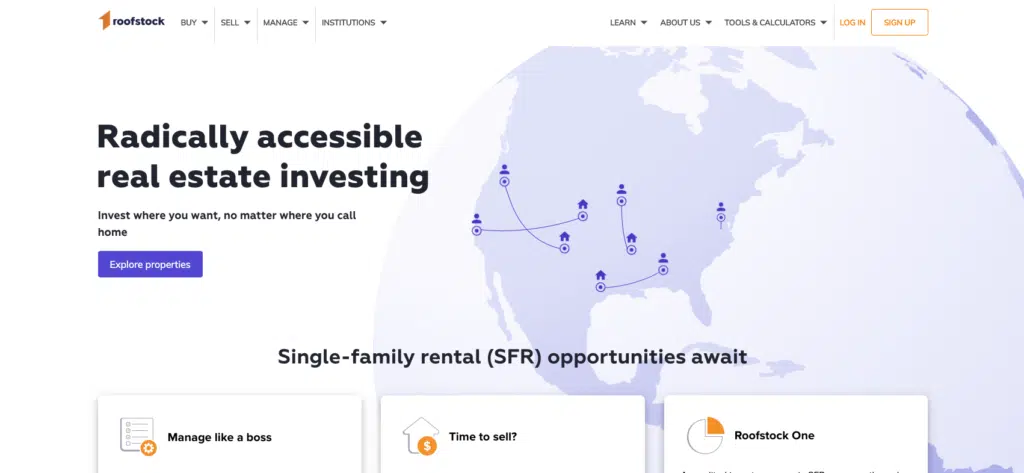| I’ve been investing with Fundrise since 2018. Disclosure: when you sign up with my link, I earn a commission. All opinions are my own. |
Over the last few years, real estate prices have skyrocketed, leaving many hopeful investors feeling priced out of the market. In addition, many who once considered becoming real estate investors have realized that becoming a landlord can be overwhelming. It’s one reason that real estate crowdfunding platforms have grown in popularity in the last few years.
When you think of crowdfunded real estate investing, Fundrise may come to mind. One of the first major players, Fundrise allowed investors to enter the real estate market without the hassle of going through the typical home-buying process.
Over the last decade, many Fundrise competitors have popped up, and investors have more options than ever.
Table of Contents
Why Did Fundrise Become So Popular?
Fundrise allows you to invest in real estate without the traditional 20% down payment, which is a hefty commitment. Instead, you can get started in real estate investing for as little as $10. Gone are the days when real estate investing was only for the rich. And you don’t have to find a broker or worry about getting stuck in a bidding war.
Fundrise has also opened up investment opportunities for non-accredited investors. This allows you to test the real estate market without making a significant financial commitment. Fundrise is a private real estate investment trust (REIT), which means you can’t buy shares on a stock market. Instead, you can buy shares of funds that contain commercial and residential real estate properties across the country.
Fundrise offers five levels of accounts:
- Starter. With this plan, you can get into real estate investing for only $10.
- Basic. For $1,000, you can begin your real estate investing journey.
- Core. This is the $5,000 entry point.
- Advanced. This is for investors willing to put down $10,000.
- Premium. The highest tier is for investing $100,000 or more into real estate.
You can read our full Fundrise review here. While Fundrise is legit and a solid choice for real estate investing, it’s still important to consider other platforms before investing.
Fundrise Alternatives
Here are the seven best Fundrise alternatives if you want to invest in crowdfunded real estate.
Gone are the days when real estate investing was only for the rich.
1. CrowdStreet

CrowdStreet is a top real estate crowdfunding website and likely Fundrise’s main competitor. However, the company specializes in commercial real estate for accredited investors with an annual income exceeding $200,000 (or $300,000 for married folks) and a net worth of $1 million (not including your primary residence).
CrowdStreet requires a minimum investment of $25,000 to get started versus $10 from Fundrise. You can, however, invest in direct deals on the marketplace or purchase shares of commercial REITs. CrowdStreet also offers advisory services so a team can work with you to customize your real estate portfolio with private deals.
CrowdStreet doesn’t charge any fees to its investors, and it offers more options to qualified folks. You can buy REITs, customized portfolios, and individual deals. CrowdStreet vets every single project so that only suitable offers enter the marketplace.
As of 2023, CrowdStreet has invested over $4 billion.
2. RealtyMogul

RealtyMogul focuses on commercial properties with over 250,000 members and 33,000 investments made. This Fundrise competitor has also been around since 2012, and the company allows members to invest in well-leased properties.
RealyMogul allows anyone to invest in REITs to earn passive income from a portfolio of income-generating properties. The minimum investment is $5,000, higher than the $10 minimum with Fundrise but lower than the $25,000 minimum elsewhere. RealtyMogul offers two private REITs for those who aren’t accredited and private real estate investments for accredited investors.
Like CrowdStreet, RealtyMogul employs an extensive vetting process. This ensures that the deals they offer have enough data to demonstrate the highest chance of a decent return. Find out more in our RealtyMogul review.
3. DiversyFund

DiversyFund is available for all investors. The platform caters to those looking to invest in apartment buildings and various multi-unit properties. DiversyFund has over 100 units to choose from, and its REIT targets rental income from undervalued multi-unit properties.
What makes DiversyFund unique is that they look for these undervalued properties so that they can invest some money into improving them to raise the value of the building. The income these properties bring in is reinvested monthly to continue improving the property until it can be sold for a profit.
Once the deal is finalized, the gains and dividends are distributed to its investors, who can take the money or reinvest it into future projects with the company.
You can invest in the REITs for as little as $500 to get started, and there are no management fees. You can get set up on the website with an account in just a few minutes. DiversyFund is ideal for long-term investors, as it takes time to renovate properties before selling them for a higher price.
DiverysFund’s mobile app lets you track your investments, enables automatic deposits, and educates you about real estate investing.
4. Yieldstreet

Yieldstreet is an alternate investment platform that gives investors access to many unique asset classes. The private investment opportunities range from art to multi-family properties.
You can invest in Yieldstreet’s Prism Fund for a minimum of $2,500 without accreditation or build a custom portfolio for $10,000 if you’re an accredited investor. The Prism Fund invests in art, commercial property, consumer, legal, and corporate asset classes to generate income for investors. It comes with a management fee of 1.5%.
Yieldstreet is the ideal platform for the more sophisticated investors looking for riskier projects with the opportunity for higher returns. You can explore different options on the platform.
For example, from one glance, we found a multi-family property in Portland that required $10,000 to get started and an art equity fund that gives you access to globally acclaimed artwork for $15,000.
YieldsStreet currently has over 400,000 registered users with over $4 billion invested. The fees depend on the type of asset class that you’re investing in. There are options for short durations and longer-term projects.
5. HappyNest

HappyNest is a real estate investing platform aimed at investors of all levels that have been in business since 2017. You don’t have to be an accredited investor or worry about investing significant money. You can invest in this private REIT to get into the real estate market without the stress of being a landlord to multiple tenants.
HappyNest has a round-up savings tool that can be linked to a credit or debit card. If you spend $7.55 on lunch, it will round up to $8 and deposit $0.45 into a round-up pool. Whenever this pool hits $5, the money gets automatically invested in more shares.
Since HappyNest is newer, they don’t have a proven track record like some of the others mentioned on this list. They also don’t have the numerous funds you could find elsewhere, as they only have one portfolio now.
6. Streitwise

Streitwise focuses on creating passive income for its investors through dividend payments. The company touts its funds as the ultimate inflation hedge, based on the average dividend of 9.2% since 2017. Streitwise has a proven track record when it comes to paying out dividends. You need a minimum investment of $5,000 to start, and the platform is open to non-accredited and accredited investors.
The company places $5 million of its money into these real estate investments to prove to its clients that they have skin in the game. Streitwise’s track record with dividend payouts compared to the others on the list makes it stand out.
The potential setback of Streitwise is that the company only offers one REIT, specializing in commercial real estate, with an approximate market value of $81 million. In addition, Streitwise charges 2% in management fees, which is higher than Fundrise.
7. Roofstock

Roofstock has opportunities for non-accredited and accredited investors looking to get into real estate investing with an emphasis on single-family rentals. The website lists the single-family properties that they invest in so you can explore the options. You can invest through a self-directed IRA or a solo 401(K) plan.
You can purchase an entire property or become a fractional owner. The company also offers the “Roofstock One” REIT for accredited investors. It’s unique because you own shares representing ownership in fully managed single-family residential units.
Roofstock is transparent in the amount of information you can obtain about residential real estate before you invest your money. This includes information about the neighborhood, the current lease, and floor plans.
Roofstock also inspects every property so that only the approved listings make it on the platform. You can also hire Roofstock’s property management team to ensure your investment is passive.
Roofstock’s “Guaranteed Rent” policy is notable. The company promises to rent out vacant properties within 45 days of the home being ready for tenants.
Top Real Estate Crowdfunding Alternatives to Fundrise
| Platform | Description | Minimum Investment | Key Features | Notable Information |
|---|---|---|---|---|
| CrowdStreet | Commercial Real Estate for Accredited Investors | $25,000 | Direct Deals, REITs, No Fees | $4 Billion+ Invested (2023) |
| RealtyMogul | Commercial Properties, $5,000 Minimum Investment | $5,000 | Private REITs, Rigorous Vetting | 250,000+ Members, 33,000+ Investments |
| DiversyFund | Apartment Buildings, $500 Minimum, No Fees | $500 | Invests in Undervalued Properties | Income Reinvested for Property Improvements |
| Yieldstreet | Unique Asset Classes, $2,500 Minimum | $2,500 (Non-Accredited), $10,000 (Accredited) | Prism Fund, Diverse Options | 400,000+ Registered Users |
| HappyNest | Real Estate for All Levels, $10 Minimum | $10 | User-Friendly App, Round-Up Savings | Newer Platform with One Portfolio |
| Streitwise | Passive Income, $5,000 Minimum | $5,000 | Proven Dividend Track Record | 9.2% Average Dividend Since 2017 |
| Roofstock | Single-Family Rentals for All Investors | Varies | Transparent Information, “Guaranteed Rent” | Whole or Fractional Ownership Options |
Other notable Fundrise competitors worth looking into:
Due to the scope of this article, we couldn’t mention every crowdfunding platform, but the good news is that there are many other alternatives to check out:
- EquityMultiple: For as little as $5,000, you can invest in high-yield and professionally managed real estate projects.
- PeerStreet: This is the first marketplace that allows you to invest in real estate debt.
- AcreTrader: If you want to diversify your real estate investments, you can buy farmland with AcreTrader.
- First National Realty Partners: This platform gives accredited investors access to grocery-anchored commercial real estate.
- FarmLand: You can invest in farmland starting with a minimum investment of $10,000.
As time passes, new real estate investment platforms continue to open up. Pretty soon, there will be something for everyone, from individual to multi-family to commercial properties.
there should be an option that matches your situation depending on if you’re looking for individual properties, commercial real estate, or multi-family properties.
The Final Word on Crowdfunded Real Estate Competition
Our Fundrise alternatives allow you to invest in real estate without being a landlord. There are platforms for all budgets, so you can start for as little as $10.
Before investing money in one of these platforms, we urge you to do further research on all of Fundrise’s competitors. We prioritize fee transparency, especially if you’re making a significant financial commitment to the project.
Also, consider the historical returns of the platform because you want to ensure that your money’s working for you, as there are other investment opportunities available.
Finally, choose a real estate crowdfunding platform that fits your goals. There are several ways to invest in real estate, so you want to ensure that the platform aligns with your goals.








Leave a Reply